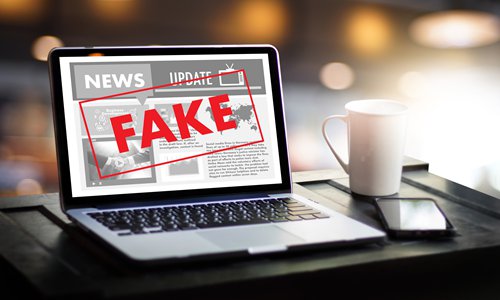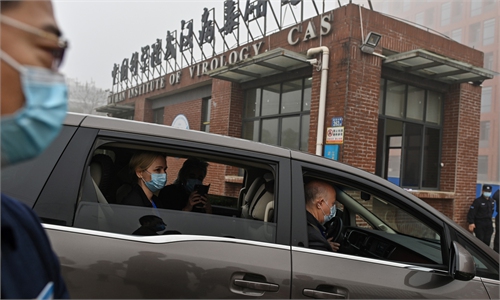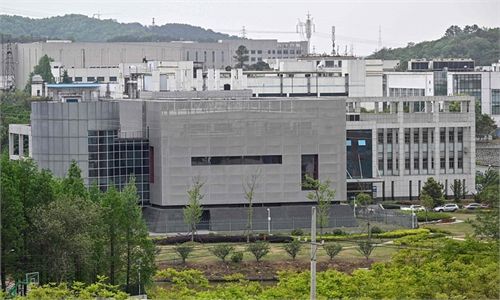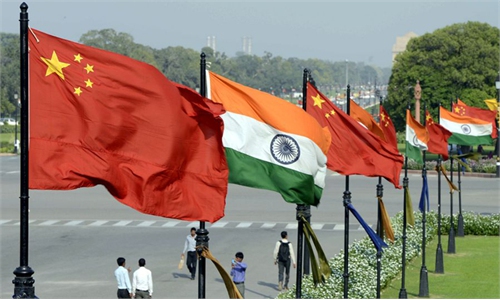Will the WSJ correct its story after its 'lab leak' report on COVID-19 is refuted again?

Photo: IC
Yuan Zhiming, director of China's National Biosafety Laboratory and professor at the Wuhan Institute of Virology (WIV), again publicly refuted the conspiracy theory led by some US media outlets and politicians about SARS-CoV-2 escaping from a lab in Wuhan, Central China's Hubei Province, on Thursday, as a "complete lie".
The "lab leak" theory was mentioned in a story in the Wall Street Journal (WSJ) earlier hyping three sick researchers, which prompted calls for probing the WIV. A Chinese online influencer sent an email to the US media outlet, urging it to make the correction on the story.
This was not the first time Yuan responded to this report. The WSJ published the story entitled "Intelligence on Sick Staff at Wuhan Lab Fuels Debate on Covid-19 Origin" on May 23, by citing so-called undisclosed US intelligence, suggesting that there were three researchers at the WIV who became sick in the fall of 2019 and shared similar symptoms with both COVID-19 and a common seasonal illness, which could add weight to growing calls for further investigation on whether the virus may have escaped from the lab. Yuan told the Global Times the next day that such a report is an outright lie that came from nowhere.
The Chinese health authority also refuted the report on Thursday, as Zeng Yixin, deputy director of the National Health Commission, said at a media briefing in Beijing that the WIV has no man-made viruses and has never conducted gain-of-function research.
Yuan said during the media briefing that there have been reports that three WIV researchers became seriously sick in 2019, but no one can provide the names of the patients despite the institute's demand. No employees or students at the Wuhan Institute of Virology were infected with the coronavirus, he added.
Given such open clarification from Chinese authorities and institutions, is it time for the WSJ to correct its story, the Chinese online influencer BUYIDAO said, as it sent an email to the editorial board of the WSJ, asking whether it will correct its previous report.
"Should the names of the three researchers at the WIV be further disclosed?" the influencer asked, representing a question many Chinese netizens have.
In an article published by BUYIDAO on Thursday, it mentioned that the writer of the Wall Street Journal story, Michael R. Gordon, who concocted disinformation by citing unsubstantiated sources about Iraq's "attempt to acquire nuclear weapons" 19 years ago, which gave the Bush administration a handy excuse to declare war on Iraq.
"How credible is this American journalist is when Gordon has such background of falsifying the news?" he asked.
The WSJ story also mentioned David Asher, a former US official who led a State Department task force on the origins of the virus for then-Secretary of State Mike Pompeo, who told a Hudson Institute seminar in March that he doubted that "the lab researchers became sick because of the ordinary flu."
Asher, along with Miles Yu, also known as Yu Maochun, the Chinese-born policy adviser for Pompeo, fabricated a so-called report in June as a policy memo for the Biden administration concerning the COVID-19 response, which was aimed at urging the US government to sanction China by using the excuse of fabricating a bioweapon targeting the WIV.
What the WSJ cited was the fabricated report from last May, which claimed that the US government had reason to believe that in the fall of 2019, the WIV researchers were infected. It showed that the Biden administration has been hyping old tricks left by its predecessor. And such conspiracy theories were also reported by some media outlets related to Murdoch's media empire, like The Australian.
"If we want the truth to come out, it's very easy. Let these journalists tell us the names of these researchers. In fact, we have suggested it earlier, but no one responded to us," Yuan said.
The influencer said there was no reply from the WSJ as of press time on Thursday, while the Chinese public is still waiting for a response.



